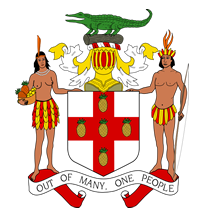The island - discovered by Christopher COLUMBUS in 1494 - was settled by the Spanish early in the 16th century. The native Taino, who had inhabited Jamaica for centuries, were gradually exterminated and replaced by African slaves. England seized the island in 1655 and established a plantation economy based on sugar, cocoa, and coffee. The abolition of slavery in 1834 freed a quarter million slaves, many of whom became small farmers. Jamaica gradually increased its independence from Britain. In 1958 it joined other British Caribbean colonies in forming the Federation of the West Indies. Jamaica gained full independence when it withdrew from the Federation in 1962. Deteriorating economic conditions during the 1970s led to recurrent violence as rival gangs affiliated with the major political parties evolved into powerful organized crime networks involved in international drug smuggling and money laundering. Violent crime, drug trafficking, and poverty pose significant challenges to the government today. Nonetheless, many rural and resort areas remain relatively safe and contribute substantially to the economy.
Jamaica is a parliamentary democracy under a constitutional monarchy and part of the Commonwealth realm.
Members:
Resources
Displaying 66 - 70 of 77Beach Control (Protected Area) (Ocho Rios) Order, 1966.
This Order declares part of the foreshore and of the floor of the sea within the limits set out in the Schedule, together with the water lying on such part of the floor of the sea, to be a protected area for the purposes of the Beach Control Act.
Beach Control (Hotel, Commercial and Public Recreational Beaches) Regulations, 1978.
This Order concerns the control of areas covered by a licence granted under section 11 of the Beach Control Act. A licence under section 11 is granted for the use of foreshore or floor of the sea. The Order prohibits, among other things, littering of beaches, use of the beach for fishing or the setting or pulling of seines or other fishnets or pots and or cut any timber.
Implements: Beach Control Act. (2005)
Beach Control (Crown Licences) Regulations, 1956.
This Order concerns licences granted under section 9 of the Beach Control Act. The Order contains rules relative to an application for licences, payment of fees and prescribes provisions included in a licence. Every licence shall contain a provision giving the competent authorities to take specified corrective action in case of encroachment not permitted by the licence.
Implements: Beach Control Act. (2005)
Facilities for Title Act.
This Act provides for procedures that may be adopted by an approved lending agency where a person applying to an agency for a loan for an agricultural purpose, or for a purpose declared under be an approved purpose by the Minister, is unable to show title under the Registration of Titles Act or a title at common law which satisfies the agency.The Act also provides for the acceptance and execution of mortgages to secure loan and for the establishment of a facilities for Title Compensation Fund and the payment into the Fund of parts of a loan granted by an agency.
Forest Regulations, 2001.
Regulations to implement provisions of the Forests Act and to provide for various other matters.The 74 regulations are placed under the following headings: Preliminary (regs. 1-4); Forest roads (regs. 5-12); Forest fires (regs. 13-17); Trespass (regs. 18-29); Enforcement (regs. 30-39); Community catchment areas (regs. 40-45); Private forestry (regs. 46-52); Leases of forest estates (regs. 53-58); Forest recreation (regs. 59-61); General (regs. 62-74).Regulation 4 defines the contents of a forest management plan in the sense of section 8 of the Act.


